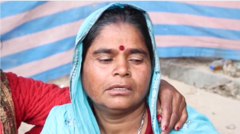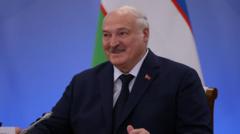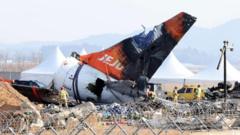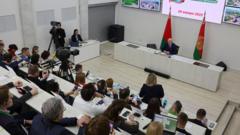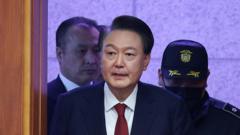Tensions reached a tipping point in South Korea as police officials were thwarted in their efforts to detain President Yoon Suk Yeol following a lengthy standoff outside his official residence in Seoul. Authorities arrived to execute a court-issued warrant for questioning related to Yoon's controversial declaration of martial law last December, which led to a political crisis. The president's supporters quickly mobilized, gathering in significant numbers around the compound to prevent officials from carrying out the detention.
Authorities Struggle to Detain South Korean President Amidst Protests

Authorities Struggle to Detain South Korean President Amidst Protests
South Korea's President Yoon Suk Yeol faces mounting pressure as attempts to detain him escalate amidst ongoing protests both for and against his leadership.
The skirmishes reached a crescendo on Friday as thousands of Yoon's supporters camped outside his residence for days, chanting slogans like “Protect Yoon Suk Yeol!” and waving national flags. The situation intensified when anti-Yoon demonstrators staged their own march toward the presidential residence, leading to clashes as both factions confronted the police and each other.
Investigators ultimately withdrew without reaching Yoon after citing fears for their safety due to the overwhelming defense mounted by pro-Yoon supporters, including personal security personnel and soldiers. This marked a significant setback for law enforcement, who described their failure to serve the warrant as "deeply regrettable."
In response to the larger protests, Yoon's defenders, many of whom are elderly South Koreans aligned with conservative groups, claim that his parliamentary impeachment is "null and void." Many in attendance voiced their outrage at the government's perceived attempts to undermine his authority.
As the conflict continues, South Korea stands on the precipice of a political crisis with the constitutional court set to begin hearings on Yoon’s impeachment on January 14. The political situation remains fluid, drawing attention not only for its immediate implications but also the broader questions it raises about governance and public sentiment in a deeply polarized society.
Activists from both sides of the aisle prepare for a tumultuous period ahead as alliances shift and protests persist, highlighting deep divisions within the nation.
In addition to the political upheaval, South Korea has recently mourned a tragic aviation disaster, further complicating the national atmosphere.
Investigators ultimately withdrew without reaching Yoon after citing fears for their safety due to the overwhelming defense mounted by pro-Yoon supporters, including personal security personnel and soldiers. This marked a significant setback for law enforcement, who described their failure to serve the warrant as "deeply regrettable."
In response to the larger protests, Yoon's defenders, many of whom are elderly South Koreans aligned with conservative groups, claim that his parliamentary impeachment is "null and void." Many in attendance voiced their outrage at the government's perceived attempts to undermine his authority.
As the conflict continues, South Korea stands on the precipice of a political crisis with the constitutional court set to begin hearings on Yoon’s impeachment on January 14. The political situation remains fluid, drawing attention not only for its immediate implications but also the broader questions it raises about governance and public sentiment in a deeply polarized society.
Activists from both sides of the aisle prepare for a tumultuous period ahead as alliances shift and protests persist, highlighting deep divisions within the nation.
In addition to the political upheaval, South Korea has recently mourned a tragic aviation disaster, further complicating the national atmosphere.



